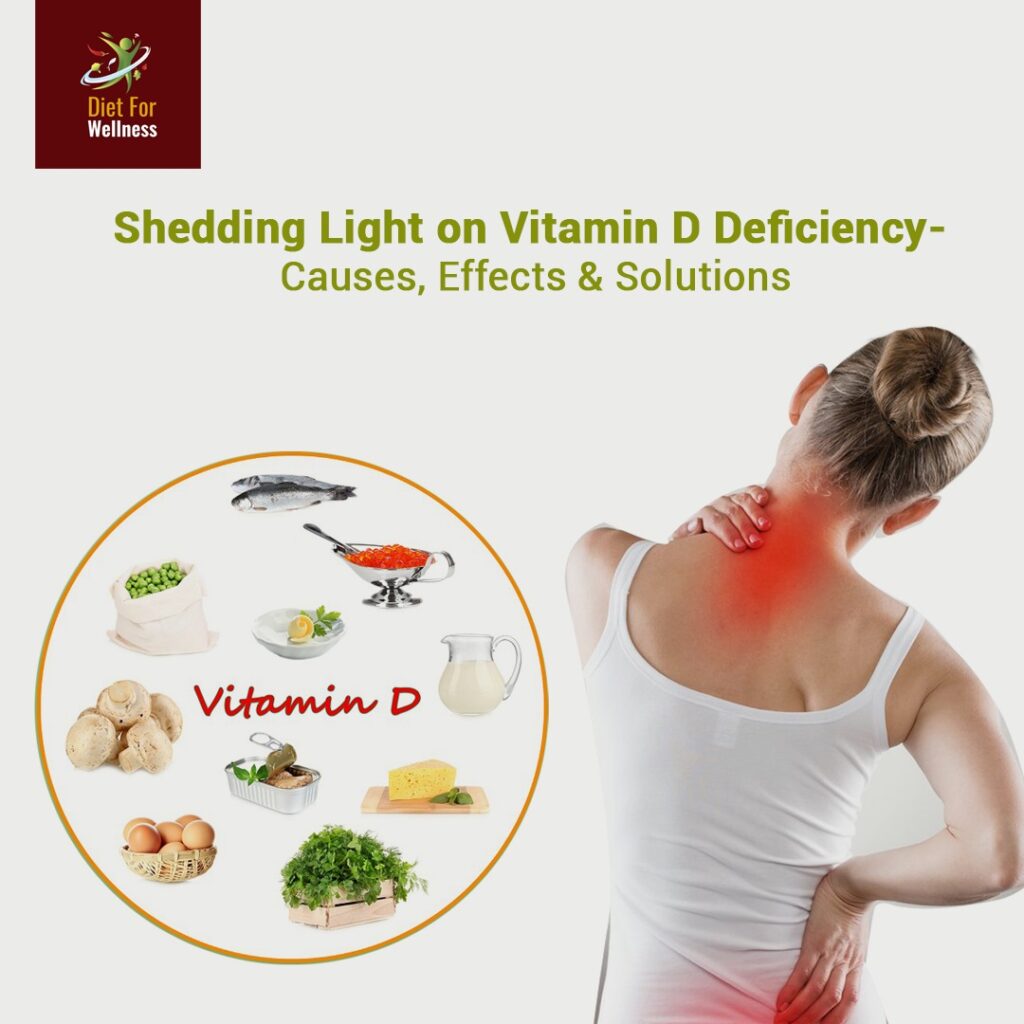Shedding Light on Vitamin D Deficiency- Causes, Effects, and Solutions

Vitamin D earns its nickname as the “sunshine vitamin” due to its synthesis in the body from cholesterol when exposed to sunlight. In recent times, this vitamin has gained considerable attention, particularly for its connection to immune health, notably amid discussions about its potential role in supporting immunity against conditions such as COVID-19.
Beyond its immune functions, Vitamin D plays a crucial role in maintaining optimal bone health and various essential bodily functions.
For most adults, the recommended daily intake of Vitamin D falls within the range of 1,500–2,000 international units (IU). While certain foods like fatty fish and fortified dairy products contain Vitamin D, relying solely on diet can often prove insufficient to meet these recommended levels.
As a consequence, Vitamin D deficiency has emerged as one of the prevailing nutritional deficiencies on a global scale.
This blog attempts to dig into the significance of Vitamin D and underscores the importance of ensuring adequate intake.
Unveiling Vitamin D
Vitamin D is a fat-soluble vitamin that primarily aids in the absorption of calcium and phosphorus in the body. It exists in two forms- Vitamin D3 (cholecalciferol) and Vitamin D2 (ergocalciferol). While some foods contain Vitamin D, the primary source for most individuals is exposure to sunlight. When UVB rays from the sun hit the skin, it triggers the synthesis of Vitamin D.
Vitamin D Deficiency
Causes
● Insufficient Sun Exposure- Modern lifestyles often entail spending prolonged periods indoors, leading to limited exposure to sunlight, especially in regions with less sunlight during certain seasons.
● Dietary Factors- While some foods like fatty fish, fortified dairy products, and certain mushrooms contain Vitamin D, many people may not consume enough of these sources regularly.
● Skin Tone- Individuals with darker skin tones have higher levels of melanin, which reduces the skin’s ability to produce Vitamin D from sunlight exposure.
● Geographical Location- Those living in regions with limited sunlight, especially during specific seasons, are at a higher risk of deficiency.
● Medical Conditions and Medications- Certain medical conditions such as malabsorption disorders or medications that interfere with Vitamin D absorption can contribute to deficiency.
Effects
● Bone Health Complications- Vitamin D plays a pivotal role in calcium absorption, contributing to bone health. Deficiency can lead to conditions like osteomalacia in adults and rickets in children, causing weakened, soft, or brittle bones.
● Weak Immune System- Insufficient Vitamin D levels might compromise the immune system, making individuals more susceptible to infections and illnesses.
● Mood Disorders- Some research suggests a link between low Vitamin D levels and mood disorders like depression and Seasonal Affective Disorder (SAD).
● Muscle Weakness and Pain- Deficiency might contribute to muscle weakness and various types of chronic pain.
Overcoming Deficiency
-
Sun Exposure- Aim for moderate sun exposure while being mindful of sunscreen use to prevent skin damage. Approximately 10–30 minutes of sun exposure to the arms, legs, or back, without sunscreen, a few times a week can help.
-
Dietary Adjustments- Include Vitamin D-rich foods in your diet, such as fatty fish (salmon, mackerel), fortified dairy products, egg yolks, and fortified cereals.
-
Supplements- Consult a healthcare professional for guidance on appropriate Vitamin D supplements, especially for individuals at higher risk or those with severe deficiencies.
-
Medical Assessment- If there’s a concern about deficiency symptoms or risk factors, seeking medical advice and getting blood tests to check Vitamin D levels is crucial.
Vitamin D deficiency proves to be remarkably prevalent, yet its symptoms often manifest subtly and without specificity, making it challenging to distinguish from other health conditions.
If suspicions arise regarding a potential deficiency, consulting a healthcare professional for a blood test is recommended.
Typically, Vitamin D deficiency is managed through supplementation, although obtaining the appropriate dosage might necessitate guidance from a doctor. Augmenting sun exposure and incorporating more Vitamin D-rich foods like fatty fish and fortified dairy products into your diet can also aid in addressing this deficiency.
Rectifying a Vitamin D deficiency can also be achieved with proper dietary habits and you can get guidance on this from dieticians and registered diet coaches.
